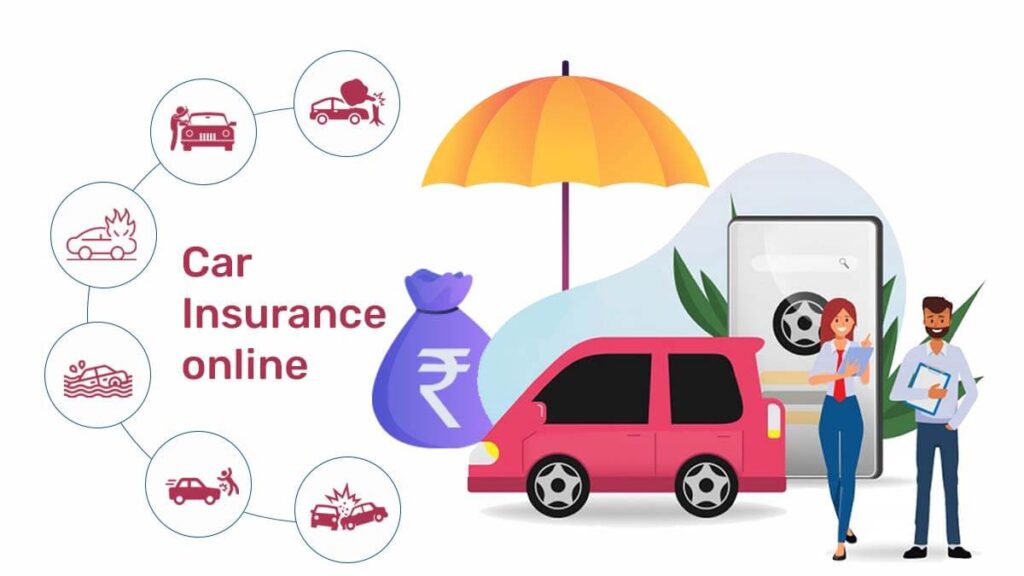Car insurance is a type of insurance that provides financial protection for individuals in the event of a car-related accident, theft, or damage. It is a legal requirement in many countries for individuals who own or operate motor vehicles on public roads. Car insurance policies typically offer coverage for various types of risks, and the specifics can vary between policies and insurance providers. Understanding the terms of a car insurance policy and selecting the right coverage for your needs is crucial for financial protection on the road. It’s advisable to shop around, compare quotes, and review policy details before making a decision. Car insurance is an essential tool for protecting both drivers and their vehicles on the road. Selecting the right coverage, understanding policy terms, and complying with legal requirements are critical aspects of responsible vehicle ownership.

Feature Of Car Insurance
Types of Car Insurance Coverage:
- Liability Insurance: Covers bodily injury and property damage liability for which the insured is legally responsible.
- Collision Coverage: Pays for damage to the insured’s car in the event of a collision with another vehicle or object.
- Comprehensive Coverage: Provides coverage for non-collision events, such as theft, vandalism, natural disasters, or animal collisions.
- Uninsured/Underinsured Motorist Coverage: Protects the insured in the event of an accident with a driver who has insufficient or no insurance.
Premiums:
Car insurance premiums are the regular payments made by the policyholder to the insurance company. The amount is typically determined by various factors, including the driver’s age, driving record, the type of coverage selected, and the make and model of the car.
Deductibles:
A deductible is the amount the policyholder agrees to pay out of pocket before the insurance company covers the remaining costs. Higher deductibles often result in lower premium costs.
Policy Limits:
Car insurance policies have limits on the maximum amount the insurance company will pay for covered losses. It’s important to understand these limits when selecting a policy.
Additional Coverage Options:
Some policies offer optional coverage, such as rental car reimbursement, roadside assistance, and gap insurance (covers the difference between the actual cash value of the car and the balance still owed on a car loan).
No-Fault Insurance:
In some regions, there is a concept known as no-fault insurance, where each party’s insurance covers their own medical expenses and damages, regardless of who is at fault in an accident.
Factors Affecting Premiums:
Insurance companies consider various factors when determining premiums, including the driver’s age, driving history, location, type of vehicle, and, in some cases, credit history.
Discounts:
Many insurance providers offer discounts based on factors such as safe driving records, multiple policies with the same insurer, anti-theft devices, and completion of defensive driving courses.
Insurance Requirements:
Each jurisdiction has specific minimum requirements for car insurance coverage. It’s essential to be aware of and comply with these requirements to legally operate a vehicle.
Claims Process:
In the event of an accident or covered incident, the policyholder must file a claim with the insurance company. The claims process involves providing details about the incident and, if necessary, getting the car inspected for damages.
Advantage Of Car insurance
Car insurance is a crucial financial product designed to provide protection and coverage for individuals who own or operate motor vehicles. It serves as a safety net, offering financial assistance in the event of accidents, theft, or damage to the insured vehicle. Car insurance is not only a prudent financial decision but is often a legal requirement in many countries to operate a vehicle on public roads. Here are key components and concepts related to car insurance:
Liability Coverage:
Liability insurance is a fundamental component of car insurance. It covers bodily injury and property damage liability for which the insured driver is legally responsible in the event of an accident.
Collision Coverage:
Collision coverage provides protection for the insured vehicle in the event of a collision with another vehicle or object, regardless of who is at fault.
Comprehensive Coverage:
Comprehensive coverage offers protection against non-collision events, including theft, vandalism, natural disasters, and collisions with animals.
Uninsured/Underinsured Motorist Coverage:
This coverage protects the insured driver in the event of an accident with a driver who has insufficient or no insurance.

FAQs Of Car insurance
Why do I need car insurance?
Car insurance provides financial protection in case of accidents, theft, or damage to your vehicle. It is often a legal requirement to drive on public roads.
What does liability coverage mean?
Liability coverage pays for bodily injury and property damage that you may cause to others in an accident for which you are at fault.
What is collision coverage?
Collision coverage pays for repairs to your own vehicle in the event of a collision, regardless of who is at fault.
What does comprehensive coverage cover?
Comprehensive coverage protects your vehicle from non-collision events such as theft, vandalism, natural disasters, and collisions with animals.
Do I need uninsured/underinsured motorist coverage?
It’s advisable to have this coverage as it protects you if you are in an accident with a driver who has insufficient or no insurance.
How are car insurance premiums determined?
Premiums are influenced by factors such as your age, driving history, type of coverage, the make and model of your car, and your location.
What is a deductible?
A deductible is the amount you agree to pay out of pocket before your insurance kicks in to cover the remaining costs of a claim.
What are policy limits?
Policy limits are the maximum amounts your insurance company will pay for covered losses. It’s crucial to understand these limits when selecting a policy.
Can I customize my car insurance policy?
Yes, many insurance providers offer additional coverage options and allow you to customize your policy based on your specific needs.
Are there discounts available for car insurance?
Yes, many insurers offer discounts for factors such as safe driving records, multiple policies with the same company, anti-theft devices, and completing defensive driving courses.
Is car insurance mandatory?
In many countries, car insurance is a legal requirement to drive on public roads. Minimum coverage levels are mandated to ensure financial responsibility in case of accidents.
What is no-fault insurance?
No-fault insurance means that each party’s insurance covers their own medical expenses and damages, regardless of who is at fault in an accident.
What happens if I file a claim?
If you need to file a claim, you’ll provide details about the incident to your insurance company. They will then assess the claim, and if approved, cover the costs according to your policy terms.
Can I change my car insurance policy mid-term?
Yes, you can usually make changes to your policy, but it’s important to check with your insurance provider and understand any potential impacts on premiums.
Do I need car insurance if I don’t drive often?
Even if you don’t drive often, having car insurance is often a legal requirement. Consider exploring low-mileage or pay-as-you-go insurance options.
Conclusion
In conclusion, car insurance is a crucial aspect of owning and operating a vehicle. It provides financial protection in the event of accidents, theft, or damage to the vehicle or property. It also helps cover medical expenses for injuries sustained in an accident. Having car insurance is not only a legal requirement in many countries but also a responsible choice to ensure the financial well-being of the policyholder and other parties involved in an accident. It not only provides peace of mind but also helps mitigate the financial burden that may arise from unforeseen circumstances. Different types of car insurance coverage options are available to suit individual needs and preferences. These options can include liability coverage, collision coverage, comprehensive coverage, uninsured/underinsured motorist coverage, and more.
It is essential to choose a reputable insurance provider that offers comprehensive coverage at a reasonable cost. Comparing quotes from different insurers and understanding the policy terms and conditions is crucial in making an informed decision. Additionally, it is important to review and update car insurance policies regularly to ensure they align with changing needs, such as acquiring a new vehicle, changing commuting patterns, or adding additional drivers. In summary, car insurance is a necessary and responsible investment for vehicle owners, providing financial protection and peace of mind in case of accidents or unforeseen events.


well
good